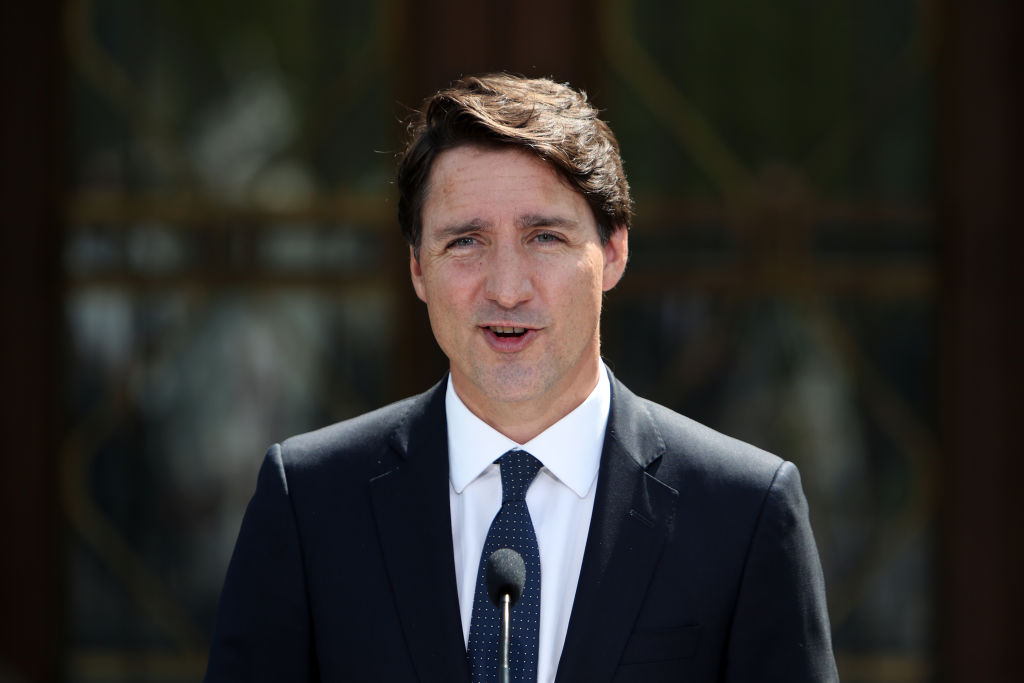Justin Trudeau’s Election Promises Were Made to Be Broken
After pledging billions in new spending to salvage his electoral fortunes, Canada’s prime minister has decided to spend the final week of the current election campaign doing what he does best: defending the wealthy from tax hikes.

Justin Trudeau speaks during a news conference in Ottawa, Ontario, Canada, on August 15, 2021. (David Kawai / Bloomberg via Getty Images)
As phony populism goes, the 2015 election campaign that ultimately made Justin Trudeau prime minister of Canada really was one for the record books. “[I am] ready,” Trudeau declared, “to do what my opponents won’t: ask our wealthiest to pay more tax, so our middle class can pay less.” This line, or some version of it, was repeated so often that millions of Canadians quite sincerely believed they were voting in an activist, left-wing government that intended to squeeze the rich.
That was bunk, of course: even a cursory look at the fine print quickly revealed that Trudeau’s proposed tax hike on incomes over $222,000 was both very small and offset by a tax cut that mostly benefited the only slightly less well-off. As political messaging, however, it was both resonant and effective — so much so that he has continued to invoke the same basic framing for years, bringing it up in Parliament on, counting conservatively, over a hundred occasions. For the international press in particular, Trudeau’s posturing was pure catnip, and readers on at least two continents were duly served headlines about the radical ambition of the new administration taking office north of the forty-ninth parallel.
In the cloying months of Trudeaumania that followed, there was virtually no counternarrative to be found anywhere in the mainstream media. Omitted from the story almost entirely was a series of remarks delivered to business audiences that suggested the Trudeau project was actually something quite different — and one much more in keeping with the grand old Canadian tradition of elite noblesse oblige. A passage from 2013 was particularly emblematic:
National business leaders and other wealthy Canadians should draw the following conclusion, and do so urgently: If we do not solve [the problems facing the middle class and low-income earners], Canadians will eventually withdraw their support for a growth agenda. We will all be worse off as a consequence. . . . Deepening anxiety yields deepening divisions in every society, and we are not immune to that vicious cycle here in Canada. We will begin to vote for leaders who offer comforting stories about who to blame for our problems, rather than how to solve them.
In much the same vein, Trudeau would later tell an audience at the bougie Canadian Club Toronto, “If we don’t deliver fairness, Canadians will eventually entertain more radical options.” At once a gesture of intra-elite signaling and a straightforward statement of political intent — coming, no less, with the ominous inflection of a fictional world leader from a made-for-TV movie delivering news of an approaching asteroid or alien invasion — Trudeau’s meaning could not have been clearer. Upon taking office, the contours of Trudeau’s project would somehow be made even more explicit, as the prime minister proudly used a 2017 interview with the Guardian to tout his bona fides as a champion of the status quo:
We were able to sign a free trade agreement with Europe at a time when people tend to be closing off. We’re actually able to approve pipelines at a time when everyone wants protection of the environment. We’re being able to show that we get people’s fears and there are constructive ways of allaying them — and not just ways to lash out and give a big kick to the system.
In this respect, Trudeau’s latest rightward pivot is very much a reversion to type. Taking aim at the social democratic New Democratic Party (NDP) during a recent campaign stop, the prime minister who once sold himself to Canadians as a populist champion now, fittingly enough, sounds decidedly hesitant about taxing the rich to fund new social programs: “The idea that you can go with unlimited zeal against the successful and wealthy in this country to pay for everything else is an idea that reaches its limits at one point,” Trudeau told those assembled at a campaign stop in La Prairie, Quebec.
Once again, the Liberals are officially campaigning on tens of billions in new spending and tax increases on big companies and high earners. The old formula, in other words, remains alive and well — Trudeau, the ersatz progressive, hinting vaguely at big, exciting things while making clear he has no intention of afflicting the comfortable.
In 2015, the favorite son of Canada’s traditional party of government successfully branded himself a transformational figure on a mission to tax the rich. Six years on, it would seem, very little has changed. With less than a week to go in Canada’s federal election, the Sheriff of Nottingham is still LARPing as Robin Hood.